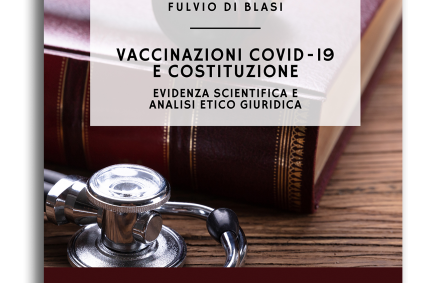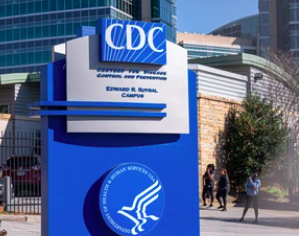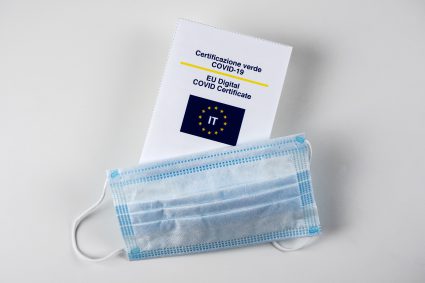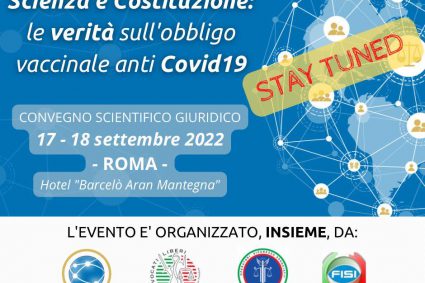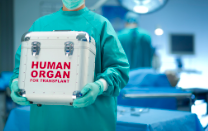
MedEthica 1/2022
Arthur L. Caplan, PhD, director of the Division of Medical Ethics at New York University Langone Medical Center and School of Medicine, recently released a video in which he addresses the following topic: “Should Unvaccinated People Be Allowed to Get Organ Transplants?”[1] His opinion, in a nutshell, is that vaccinated people should have priority over the unvaccinated, or, in other words, that vaccine status should be considered to the advantage of the vaccinated.
Caplan’s discussion is not limited to COVID-19 vaccination. Still, he admits that inquiry on vaccination status is a recent addition to the “lifestyle questions” that the transplant centers ask. Fair enough, but the obvious and immediate question we should ask is, “Why?” Is COVID-19 worse than any other infectious disease for which a vaccine exists? If yes, is that still the case even if the emergency is by now mostly in the past? If yes, for how long should COVID-19 remain such a key issue for the transplant centers? Finally, is this the case everywhere in the world independently from local and personal levels of risks?
1. Does Vaccination Help the Transplant to Work?
Let’s focus first on Caplan’s general premise underpinning his position, which reads like this:
“if vaccination, before a transplant, helps the transplant to work because it builds up immunity to infectious diseases…then…”.[2]
This is a logical premise that is supposed to lead to Caplan’s conclusion. But what does this premise mean exactly? How does vaccination help the transplant to work?
Logically speaking, there are two possibilities:
1) Vaccination helps during transplant because the organ is infected or because an infected doctor or healthcare worker is participating in the operation. This would be very bad for the transplant center, though, which would do better to ask different questions before the transplant, not to the patient, but to the donor and the employees; questions like, “Are you ill?,” “Have you been abusing your vaccine passport, failing to take precautionary measures due to thinking that this vaccine makes you immune?”
Now, if the transplant center is so incompetent that it does not verify whether the organ and/or employees involved are infected, we must have it shut down or replace its personnel. Certainly, we should not deny a transplant to an eligible patient based on the center’s negligence.
2) Vaccination helps “after” the transplant because, hypothetically, the vaccinated patient, after a successful transplant, will not get (sometime in the future) the disease for which he or she has been vaccinated. The unvaccinated, on the other hand, may spoil the transplant’s hopes, so to speak, by becoming infected, at some point in a hypothetical future, with the relevant disease.
Clearly, this is not a real way to help the transplant to work. Rather, it involves an arbitrary judgment regarding the patient’s future.
In truth, the only available undeniable fact is that this patient is healthy, which means either
a) that the infectious disease is not such a terrible or inevitable outcome, after all, otherwise the patient would have been already infected;
b) that this patient has a very healthy lifestyle making him or her resistant to that disease;
c) or that he or she is naturally immune to that disease.
2. Natural Immunity and Healthy Lifestyle
In fact, this is the most surprising thing about Caplan’s presentation: he does not even mention natural immunity.[3] He assumes that today transplant centers should ask if people are vaccinated, but they don’t need to ask whether they are naturally immune.
I have had all the exanthematous diseases (measles, mumps, rubella) for which a vaccine exists today (there were no such vaccines available to me when I was a child). Moreover, no one in my family has had COVID-19. We have been very careful and, who knows, maybe we even did have it. Clearly, our lifestyle has been (and will always likely be) much more prudent than that of the many multi-vaccinated people who continue to get infected today. I personally know many of them, even among my close relatives.
The point is that, after contracting those diseases, I lived more than 50 years of my life without any resulting health issues, and I lived through the entire COVID-19 pandemic without any of my close family members contracting COVID-19.
Shouldn’t this “lifestyle” give me priority in case of a transplant? In other words, after living all my life without certain vaccines, what is more accurate,
a) to posit (i.e., statistically calculate) that I’m going to contract the relevant viruses in my (fewer) years to come, or
b) to acknowledge that my lifestyle (or natural immunity) makes me belong to the category of people less likely to contract those diseases and/or suffer serious consequences from them?
3. Non-Vaccinated People as Immunosuppressed?
Caplan continues by saying that “vaccination…helps the transplant to work” because non-vaccinated people are “immunosuppressed.” But is it medically correct to claim that a healthy person is immunosuppressed if he/she is not vaccinated? This is a particularly weak point in Caplan’s speech.
To me, this implies that healthy people are to be considered ill or sick, which is the (not so secret, anymore) dream of pharmaceutical companies. They are in the “inventing diseases” business, like famously making shyness “social anxiety disorder.”[4] Now it’s the turn of the unvaccinated who are allegedly not healthy anymore, but rather sick, or immunosuppressed.
Moreover, this notion disregards natural immunity altogether, which may be difficult/impossible to detect given that many people may have had COVID-19 without knowing it.
4. Does Caplan’s Position Constitute a Form of Punishment?
Caplan says, I quote,
“It’s not punishing people who choose not to vaccinate any more than saying you can’t smoke if you’re going to get a heart transplant. It’s a decision based on what’s going to work and what increases the chance of a good outcome.”
Yet I don’t smoke, I don’t drink, and I’ve been very successful in not getting COVID-19, which says a lot about who I am and what my healthy lifestyle is.
I don’t see how this is not a punishment for people like me.
Here one must note the subtle way in which Caplan equates smoking with not being vaccinated. However, smoking does make people unhealthy, while, on the other hand, non-vaccinated people are healthy. We are all well acquainted with the condition of a smoker’s lungs. The reasons for not prioritizing smokers as transplant recipients are well founded upon the physiology of smokers. On the contrary, there is nothing pathological per se in the physiology of an unvaccinated individual. We are again in the unethical area of inventing pathologies for non-scientific purposes.
Caplan adds,
“If vaccination does that [i.e., helps the transplant to work], then COVID-19 vaccination status or any other vaccination status—including potentially shingles, the zoster vaccine—is relevant to take into account.”
But does COVID-19 vaccination do that? Does Caplan know that COVID-19 vaccines don’t provide immunity? Does he know that COVID-19 is not such a dangerous disease for healthy people? Does he know that COVID-19 is not equally dangerous for different age-groups and categories of people? Does he know that in many places in the world COVID-19 is not a medical emergency anymore, which drastically reduces the clairvoyant judgment that Caplan believes the transplant center should exercise regarding the possible future of its patients?[5]
Why does he not suggest that transplant centers should ask relevant questions about the danger of COVID-19 for each potential patient and/or the specific groups and categories to which that patient belongs?
The fact that Caplan does not even mention all these relevant issues and questions reveals that his remarks sound more like the proposal of a new form of punishment than anything else, or that his motives for these remarks are closer to vindictiveness than to serious and objective ethical and scholarly discussion.
5. Are Vaccinated People Eligible?
Caplan proceeds to say that vaccination is probably not the only thing to take into account, but
“Is it something that transplant centers appropriately, ethically, can weigh knowing that there are many people who are vaccinated who are eligible for transplants? I’m going to say yes.”
Here I’m puzzled. What does this statement actually mean?
a) Are vaccinated people necessarily eligible?
b) Are they eligible because they are vaccinated?
These are not negligible questions. I already referenced the undeniable fact that these new vaccines do not confer immunity (which alone makes Caplan’s initial premise indefensible), but there is more.
Does Caplan know that COVID-19 vaccines are still under scrutiny? If his premise is not intended to be a punishment, he should rather focus on alerting transplant centers, for example, that vaccinated people may have a weaker immune system than the unvaccinated, or that they may have a shorter life expectancy due to cardiac or thrombotic issues that are still under investigation.[6]
Caplan should know that COVID-19 vaccines are not without risks, that many of their risks are still unknown, and that the true extent of these risks remains unknown.
The unvaccinated, on the other hand, don’t face any unknown risks from the COVID-19 vaccines and do not necessarily run serious risks from COVID-19, either.[7]
Why doesn’t Caplan consider these factors if he is not motivated by a desire for punishment or revenge?
6. Vaccination is Not the Only Meritorious Choice
Caplan does not even mention the fact that COVID-19 is treatable, especially in the case of healthy people.[8] In fact, it is treated very well and is therefore comparable to any infectious disease for which the problem of transplant selection has never been raised.
Vaccines are not the only possible choice that people have to face the risk of COVID-19. Today, even the pharmaceutical companies have produced early-treatment pills.[9]
Again, why doesn’t Caplan consider the fact that an unvaccinated healthy person, even if he were to get COVID-19 at some hypothetical time in the future, could be treated and might recover easily without running any actual risk of dying?
How much does Caplan think that a transplant center should assume about the future without falling into mere prejudices dictated by ideology and a desire for social revenge?
In ethical theory, there is a reasonable limit to what we should assume about the future in our calculations about it. Anyone who exceeds that limit is more than unreasonable or anti-scientific; he is evil.
7. But Are the Organs of the Vaccinated Dangerous?
Let me now raise a totally different issue, as a potential patient and as an expert in ethical theory.
If I had to undergo an organ transplant (God forbid), I would like to know if the donor was vaccinated against COVID-19.
As I stated above, scientifically speaking, COVID-19 vaccines are still being studied, and their possible influences on the human organism and immune system are not fully known.
Even from a legal point of view, we are still in a phase of enhanced pharmacovigilance—a stronger one—precisely to be able to understand in the future what exactly is the level of efficacy and safety of these new products, which do not operate like previous vaccines to the point that to call them by this term, “vaccine,” required a change in the definition of the term itself in 2021. This change still lacks adequate scientific justification.
Ethically speaking, people should be informed that the use of these “vaccines” involves unknown risks, which may well affect the functioning of organs taken from vaccinated people.
Unknown means unknown. We just need to wait and see. We ethicists know that people who talk about unknowns as if they were “certainties” are not reliable. So, why doesn’t Caplan address this issue, which for me, at least, is very important?
As a lawyer, an ethicist, and a logician, I’m accustomed to look at reality always from both parties’ points of view and, indeed, from every possible point of view. Shouldn’t Caplan at least try to look at the relevant issue also from my point of view, the point of view of a healthy unvaccinated person who lives a healthy lifestyle?
I sincerely hope that any serious ethics scholar will carefully consider all relevant factors and viewpoints before expressing opinions on such sensitive topics as potentially restricting people’s access to organ transplants.
[1] Caplan, A.L. (2022). “Should Unvaccinated People Be Allowed to Get Organ Transplants?,” Medscape – Commentary, Published: April 14, 2022, https://www.medscape.com/viewarticle/968563?uac=252680MT&faf=1&sso=true&impID=4189039&src=mkm_ret_220425_mscpmrk_trdalrtuk018_int#vp_2; F. Di Blasi, C. Isidoro, B. Osimani, L. Teodori (eds.), Le vaccinazioni COVID-19: evidenza scientifica e risvolti etico-giuridici (Phronesis Editore: Palermo 2022, forthcoming).
[2] The emphasis is mine.
[3] See, e.g., McGonagle, D.G. (2022). Health-care workers recovered from natural SARS-CoV-2 infection should be exempt from mandatory vaccination edicts. The Lancet. V. 4, Issue 3, E170, March 01, 2022. Published: February 07, 2022. DOI: https://doi.org/10.1016/S2665-9913(22)00038-8.
[4] See F. Di Blasi, Vaccino come atto di amore? Epistemologia della scelta etica in tempi di pandemia (Phronesis Editore: Palermo 2022); R. Moynihan, A. Cassels, Selling Sickness: How the World’s Biggest Pharmaceutical Companies Are Turning Us All into Patients (Nation Books: New York, 2005); M. Petersen, Our Daily Meds: How the Pharmaceutical Companies Transformed Themselves into Slick Marketing Machines and Hooked the Nation on Prescription Drugs (Picador: New York, 2009); C. Lane, Shyness: How Normal Behavior Became a Sickness (Yale University Press: New Haven, 2007).
[5] On these issues, see F. Di Blasi, C. Isidoro, B. Osimani, L. Teodori (eds.), Le vaccinazioni COVID-19: evidenza scientifica e risvolti etico-giuridici, cit.; F. Di Blasi, Vaccino come atto di amore? Epistemologia della scelta etica in tempi di pandemia, cit.; F. Di Blasi, The Death of the Phronimos. Faith and Truth about Anti Covid Vaccines (Edizioni Phronesis: Palermo 2021).
[6] Ibid.
[7] This has always been clear to experts even in the most severe initial moment of the pandemic. See., e.g., Ferguson, N., Faydon, D., Nedjati Gilani, G., Imai, N., Ainslie, K., Baguelin, M., Bhatia, S., Boonyasiri, A., Cucunuba Perez, Z., Cuomo-Dannenburg, G., Dighe, A., Dorigatti, I., Fu, H., Gaythorpe, K., Green, W., Hamlet, A., Hinsley, W., Okell, L., Van Elsland, S., Thompson, H., Verity, R., Volz, E., Wang, H., Wang, Y., Walker, P., Walters, C., Winskill, P., Whittaker, C., Donnelly, C., Riley, S., Ghani, A. (2020). Report 9: Impact of non-pharmaceutical interventions (NPIs) to reduce COVID19 mortality and healthcare demand. Imperial College COVID-19 Response Team. March 16, 2020. Published Online, https://spiral.imperial.ac.uk/handle/10044/1/77482.
[8] See, e.g., COVID-19 Early Treatment Fund (CETF), https://www.treatearly.org/.
[9] Di Blasi, F. (2022). Publication Planning, Early Treatments, and New Super Pills. Questioni di bioetica. Vol. 1/2022. Published online April 12, 2022. https://www.questionidibioetica.it/publication-planning-early-treatments-and-new-super-pills/.




